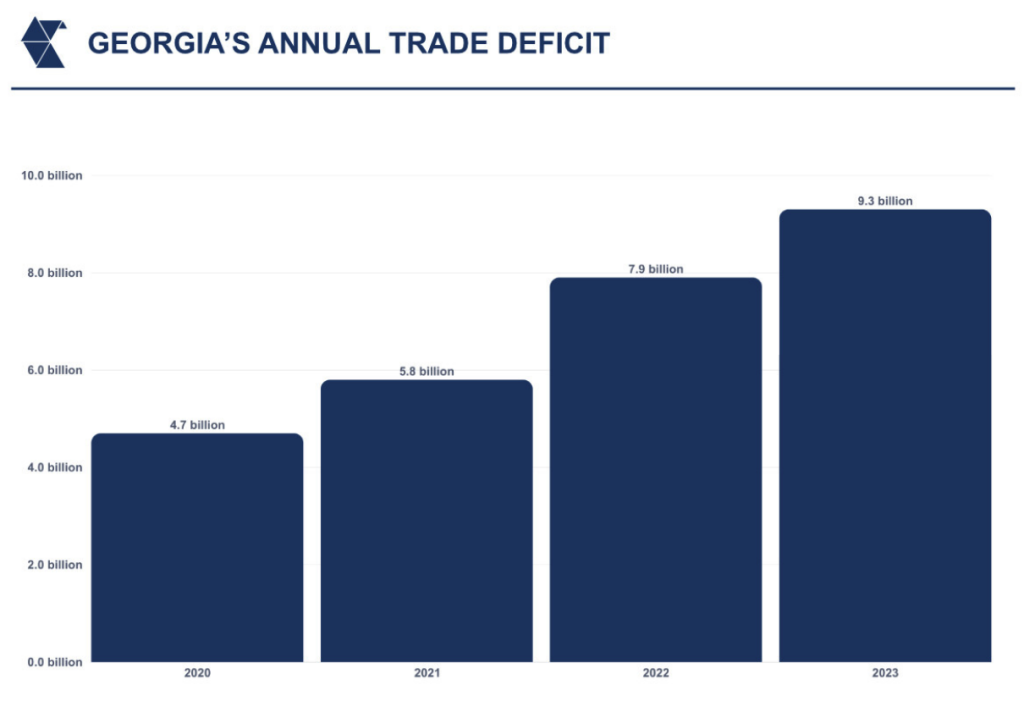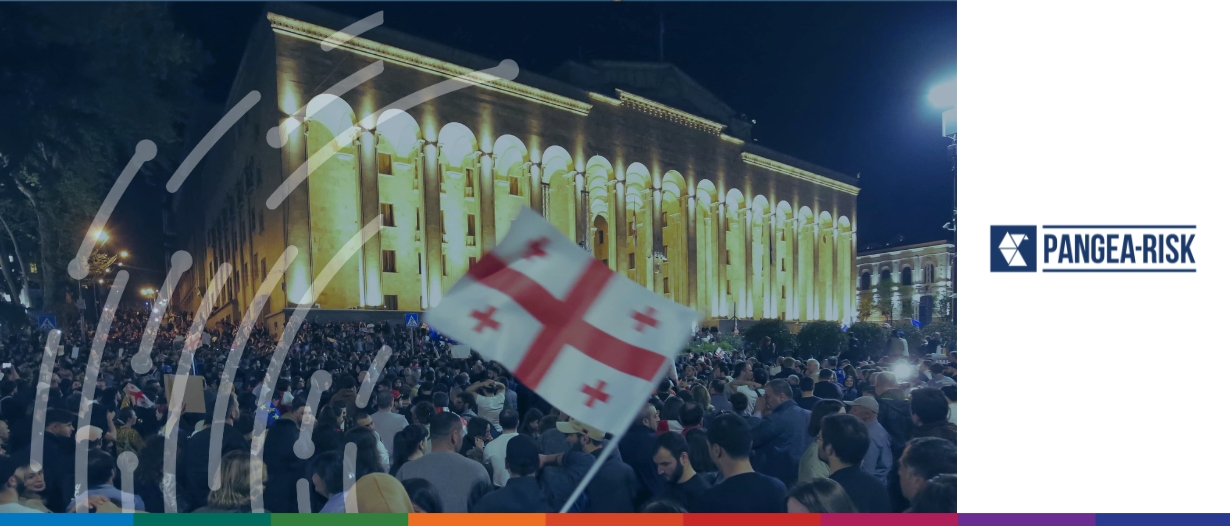Estimated reading time: 5 minutes
Orthodox Christians around the world celebrated Christmas on 7 January. For thousands of Georgians in Tbilisi, festivities took the form of anti-government demonstrations, as crowds gathered at a church opposite parliament in the city’s centre.
The European Union (EU) formally recognised Georgia as a candidate for full membership in December 2023. But since then, the ruling Georgian Dream (GD) party has steered the country further from its promises to reform to align with EU members. The October 2024 general election, for instance, brought claims of illegitemacy from near and far – including from Georgia’s then president Salome Zourabichvili – with alleged (though highly likely) ballot-rigging, voter intimidation, and threats to ban opposition.
Suspicions that the GD were hampering EU prospects were realised when, on 28 November, Prime Minister Irakli Kobakhidze announced that the government would delay EU membership talks for another four years. There have been mass protests every day since the announcement.
The parallels compared with a year ago, when on 14 December 2023 Georgians took to the streets to celebrate the country gaining EU candidate status for membership, are darkly ironic.
The most recent flashpoint is when Mikheil Kavelashvili was sworn in as president of Georgia on 29 December, a move which Zourabichvili arraigned as a “parody”. Their aggressive suppression proves that the protests opposing Kavelashvili and the GD have exposed and exacerbated systemic flaws in Georgia. These flaws, coupled with the government’s pro-Russia stance, threaten Georgia’s geopolitical aspirations of EU membership.
Economic impact of ‘foreign agents’ and earlier protests
Prime Minister Kobakhidze has characterised recent currency fluctuations as temporary and insisted the economy continues to progress. Natia Turnava, Acting Governor of the National Bank of Georgia, maintains the central bank stands ready to deploy “all necessary tools” to stabilise the lari.
Yet earlier protests against the controversial ‘foreign agents’ law saw the lari tumble 6% by June, forcing the central bank to expend $160 million of reserves defending the currency. Foreign direct investment has plummeted 64% year-on-year in the first quarter of 2024.
This crisis, nicknamed the ‘Russia law’ by critics, required any organisation that gets more than 20% of its funding from Western sources to register as an ‘agent of foreign influence’. Zourabichvili vetoed the law upon its passage through parliament on 18 May 2024, but parliament overrode the veto.
The country’s structural vulnerabilities compound challenges which protests may bring. Georgia’s trade deficit reached $9.3 billion in 2023, leaving it particularly exposed to currency weakness. Any sustained depreciation of the lari would inflate import costs, potentially triggering viciously widening deficits and rising inflation.

Georgia’s annual trade deficit. Source: Pangea-Risk
The vital tourism sector, which generated nearly $80 billion in economic impact last year and supports over 463,000 jobs, faces particular risks from continued unrest. The industry had shown remarkable resilience, adding 20,000 jobs and delivering record tax revenues of $5 billion in 2023. But international perception of the country’s safety hampers its appeal as a tourist destination.
Finally, external support is waning. The EU and US have already withdrawn $220 million in aid over various concerns: in particular, over the ‘foreign agents’ legislation. Prime Minister Kobakhidze’s recent rejection of further EU financial assistance signals a potentially costly drift from Western partners. With protests showing little sign of abating, these converging pressures threaten to destabilise Georgia’s macroeconomic framework in the months ahead.
Pangea-Risk ratings
Despite Pangea-Risk attributing an elevated risk to the country in general, particularly with regard to political instability, risk is decreasing in the Georgian economy in many other aspects.
Considering Confiscation, Expropriation, Nationalisation, and Deprivation Insurance (CEND), political risk coverage for businesses with ownership interest in property abroad, Georgian governments have adhered to property rights and international investment standards throughout the 21st century.
In this vein, State Contract Alteration appears safe, with Georgian governments seeking to create favourable business conditions, despite suspicions of politically motivated handling of certain contracts. In this manner, Taxation Alteration is decreasing in risk: tax policies over the last two years have made administration more efficient. Georgia’s fiscal deficit was 2.4% of GDP in 2023, and public debt is expected to remain under 50% this year, making Pangea-Risk predict that significant tax changes will be unlikely. Finally, since Georgia has a liberal foreign exchange regime, Currency Inconvertibility and Non-Transfer (CINT) risk is also low.
Nonetheless, the anticipated slide towards authoritarianism under the ruling GD may heighten investor anxiety regarding state capture, with political instability disrupting business activity; the country’s reliance on external financing may also affect its risk of Non-Payment.
Furthermore, while metrics like Bribery and Corruption report a decreasing risk score, aided by the establishment of an Anti-Corrpution Bureau (ACB) in 2022, Pangea-Risk notes that high-level corruption remains immanent and entrenched in the country. Similarly, the decrease in the Insecurty rating is accurate from a business perspective, but it is important to note the impact of wrongful detention and clashes on locals.
Though the situation appears tentative, Georgia is a fundamentally business-friendly environment. The fear now is that this position may be threatened by a wave of instability growing into a tsunami.
—
In Georgia, the potential for revolutions to bring about change has been proved over. The 2003 Rose Revolution, amongst a series of colour revolutions across the Caucuses region, culminated in the end of Soviet-era leadership in the country.
Kornely Kakachia, director of the Georgian Institute of Politics in Tbilisi, said, “The more they oppress people, the more they go out,” he said. “Georgians will not tolerate this. Too many people [have] got fed up with Ivanishvili.”
The international community has some role to play in supporting the civil liberties of the Georgian people, as they so clearly desire. Otherwise, the EU’s endorsement of and membership offer to Georgia is nothing more than lip service.





























